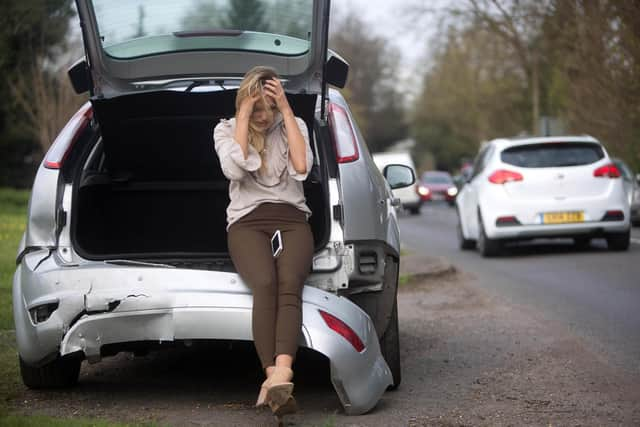Scotland's car insurance shock and how you can save money: Central Belt drivers see premiums double in two years to £900
The average cost of insuring a car in the UK has topped almost £1,000, adding to inflationary pressures and sparking fears that already cash-strapped motorists could be driven off the road.
Drivers can now expect to pay an average of £995 for their annual car insurance premium - the highest price on record, according to the latest findings from price comparison website Confused.com. It means that prices have increased by an average of £366, or 58 per cent, in the past 12 months, though there are signs that may have cooled in the last couple of months.
Advertisement
Hide AdAdvertisement
Hide AdThe firm said a 64 per cent (£350) increase in insurance prices in central Scotland meant that premiums there have doubled in two years, with the average driver now paying £897. London remains the most expensive part of the UK for car insurance. Drivers in inner and outer London pay £1,607 and £1,291 respectively, on average.


The huge annual increases follow several years of relatively stable or even falling premiums and have been fuelled by general inflationary pressures impacting the cost of repairs and claims. Since the end of the pandemic, the number of cars on the road has increased to a normal, if not inflated level. This means the risk of accidents and claims is a lot higher than before.
Cars are also holding their value for longer, or are equipped with more technology or expensive equipment, particularly in the case of electric vehicles, with their costly battery packs. This means the cost to replace a car is more than before.
Car insurance is one component in the inflation basket compiled by the Office for National Statistics, though it is unlikely to have played a part in the latest surprise increase in the headline rate of inflation to 4 per cent in December from November's low of 3.9 per cent. The Confused.com index shows that over the past three months, insurance prices only increased by 8 per cent, or £71, on average.
Between March and September 2023, insurance quotes increased by 18 per cent and 19 per cent for each three-month period. However, with the UK economy still fluctuating, and the insurance industry reacting to this, how long increases stay at the lower pace seen in recent months remains to be seen, the firm added.
Motoring experts say drivers can try to keep a lid on costs by paying for insurance annually as many firms charge an additional premium to split it up monthly, increasing the level of voluntary excess, being accurate with the expected annual mileage given to your insurer (fewer miles can lead to savings), enhancing car security and simply shopping around.
Louise Thomas, motoring expert at Confused.com, said: “Like a lot of our expenses, car insurance is getting more costly. And this is likely to be the case for some time. Claiming is one of the biggest factors when it comes to insurers pricing up policies. And with the cost of paying out for claims being considerably high, insurance prices are going to be too.
“While it looks like increases could be slowing down for now, we still need to be doing what we can to keep these costs as low as possible. Things like increasing security, reviewing how many miles you drive or adjusting your excess could bring your overall cost down. Ultimately, shopping around is the only way to know you’re paying the cheapest price available to you. With prices so high, it’s a very competitive market.”
Comments
Want to join the conversation? Please or to comment on this article.